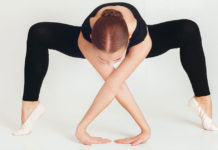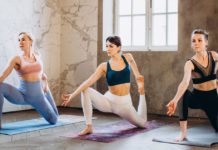The birth of yoga occurred in northern India over 5,000 years ago. The word comes from the oldest sacred text of Rig Veda. The Vedas are a collection of rituals, mantras, and songs that are used by Brahmans, the Vedic priests. The real concept of it is for spiritual development practices that train your mind to self-observe and become cautious of your nature. Today, a lot of people love yoga because of the benefits that they get from it. As time goes by, it has been polished, improved and evolved into various types that bring about different benefits.
What makes yoga different from other exercises?
Yoga and exercise can both help you stay in shape and be healthy. However, there are many differences regarding their specific benefits to both your mind and body.
The main goal of it is to harmonize the mind, breathing, and body. It builds strength, balance, and flexibility. It is unique with its ability to improve focus, relieve stress, lead to positive perspectives, lead to weight loss and be therapeutic to some certain health problems.
Regarding exercise, it improves overall physical fitness and health by aerobic activity that is good for heart function. It strengthens the muscles and the cardiovascular system. It is also good at losing weight and improving the immune system.
In summary, the effect goes beyond the body. It improves mental and physiological health. Also, it alleviates, as well as prevent, certain health problems, while exercise can benefit your entire physical fitness and your heart function.
How to start?
A lot of people think that if you are not flexible, you cannot join it.
It is okay if you are a beginner and are not capable of doing the poses right, but if you continue to do it, your body and muscles will eventually continue to flex and improve. To do that, you need to wear proper attire to execute properly the poses in sessions. You can wear proper leggings or stretchable shorts. You can also wear t-shirts that are not too oversized for you.
There is no required footgear; it is more comfortable to do the poses if you are barefoot.
Most of the studios have their own mats, but if you want, you can bring your own mat.
The sessions last for one hour or one hour and a half. There is no limit as to the number of times you want to have sessions every day.
The more you do them, the more you will have its benefits.
Types of yoga
The evolution of this is now focused on strength, balance, breathing, and exercise. It can help boost both physical and mental well-being.
There are a lot of styles and different styles have different benefits.
Each one has a unique way of improving the inside and outside of the body. You just need to choose what suits your fitness level.
Here are the types and styles that you can choose from:
Ashtanga yoga
This type of exercise became popular during the 1970s. It uses ancient techniques. There are six established sequences of posture in this type that are associated with every movement to breathe.
Bikram yoga
It consists of 26 poses and two breathing exercises that are executed in a studio where the temperature ranges up to nearly 105 degrees Fahrenheit and 40 percent humidity.
Here you can learn about bikram Yoga What Are Its Health Benefits
Hatha yoga
It is the general term for any type of yoga that teaches physical postures. “Hatha” classes serve as an introduction to the basic postures of yoga.
Iyengar yoga
This type uses props such as blankets, blocks, chairs, and bolsters. This also focuses on finding and correcting alignments in each pose using props.
Jivamukti yoga
This type of exercise emerged in 1984 and assimilates spiritual teaching and certain practices that focus on the fast-paced flow between poses rather than the poses themselves.
Kripalu yoga
Kripalu teaches practitioners to know, accept and learn from the body. The classes usually begin with some gentle stretching and breathing exercises, followed by a sequence of individual poses and final relaxation.
Kundalini yoga
Kundalini means “coiled, like a snake”. This type is a system of meditation where the goal is to release pent-up energy. The class usually starts with chanting and ends with singing.
Power yoga
This one is inspired by the traditional ashtanga system. Practitioners have created active and athletic yoga during the late 1980s.
Prenatal yoga
Prenatal yoga is designed for pregnant women. The practitioners teach poses that are safe for a pregnant woman. This helps a pregnant woman stay in shape after giving birth.
Restorative yoga
This kind promotes relaxation. The session works for four or five easy poses and uses props such as bolsters and blankets to promote deep relaxation without putting much effort into maintaining a pose.
Risk factors and side effects
Yoga is known for its safe and low impact practices when you are guided properly with well-trained instructors. Injuries due to yoga are rare; however, there are factors that you should consider before starting.
Even if there is a type of yoga for pregnant women, it doesn’t mean that it applies to all pregnant women. You should consult your doctor first before doing yoga. Also, if you have health problems such as high blood pressure, sciatica, and glaucoma, you should see first a health expert before starting yoga.
If you are a beginner, try the simple poses first before jumping into difficult ones, such as the lotus position, forceful breathing, and headstands.
Do not make yoga an alternative treatment if you have some health problems.
Also, do not stop taking medicines, except when your doctor advises you to stop them.
Want more tips about yoga, meditation and health? Visit more of our pages and learn more about yoga exercises and products!











